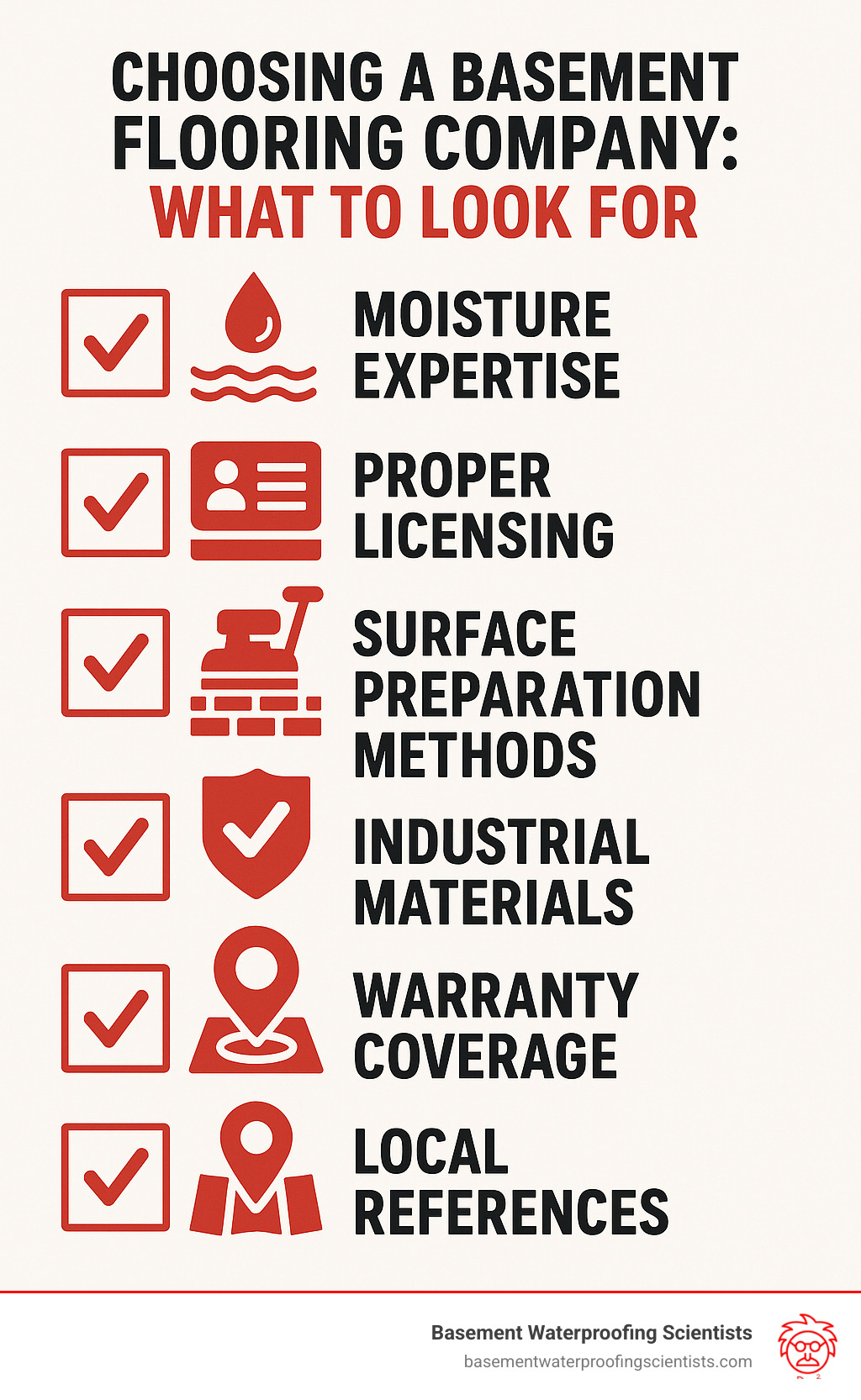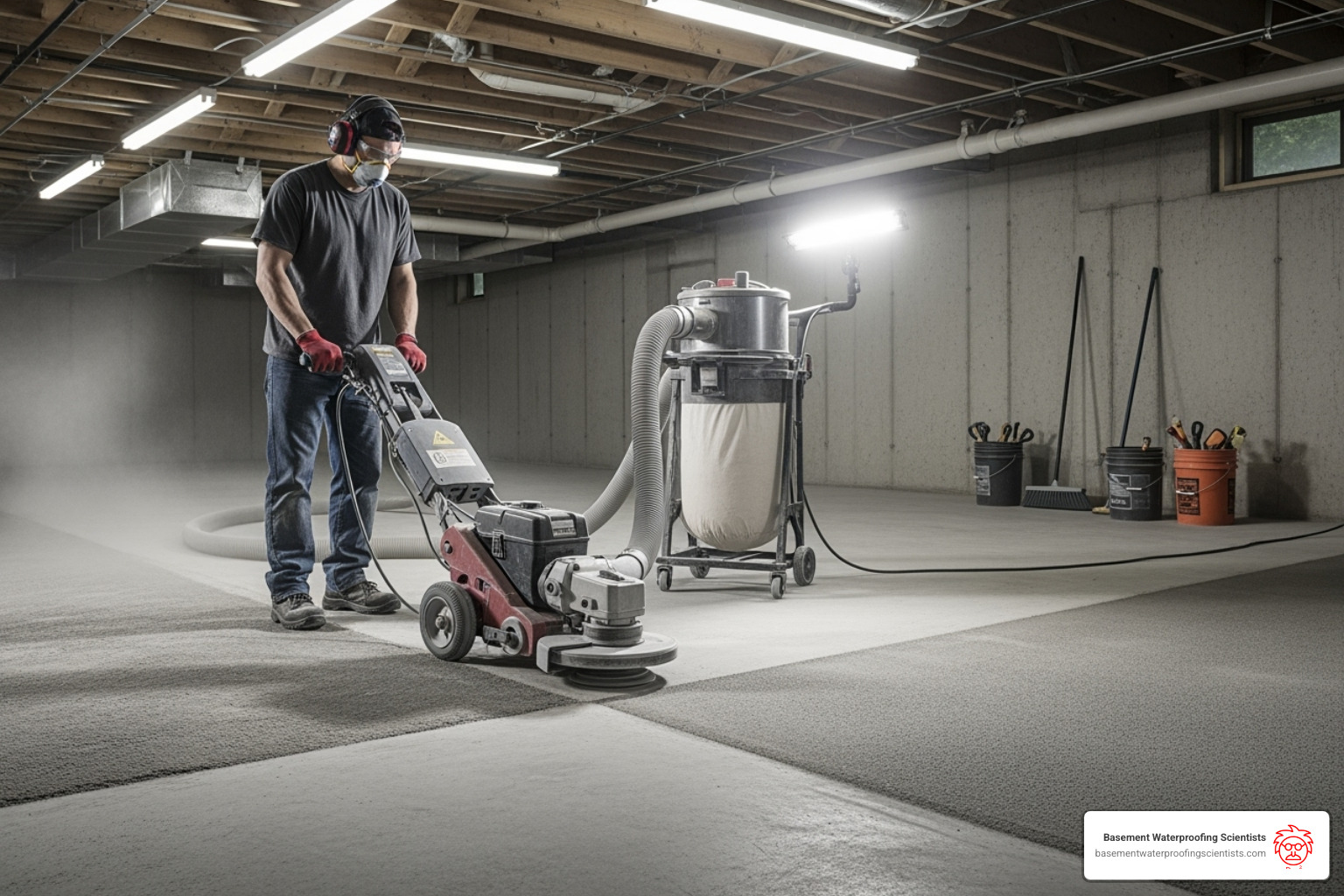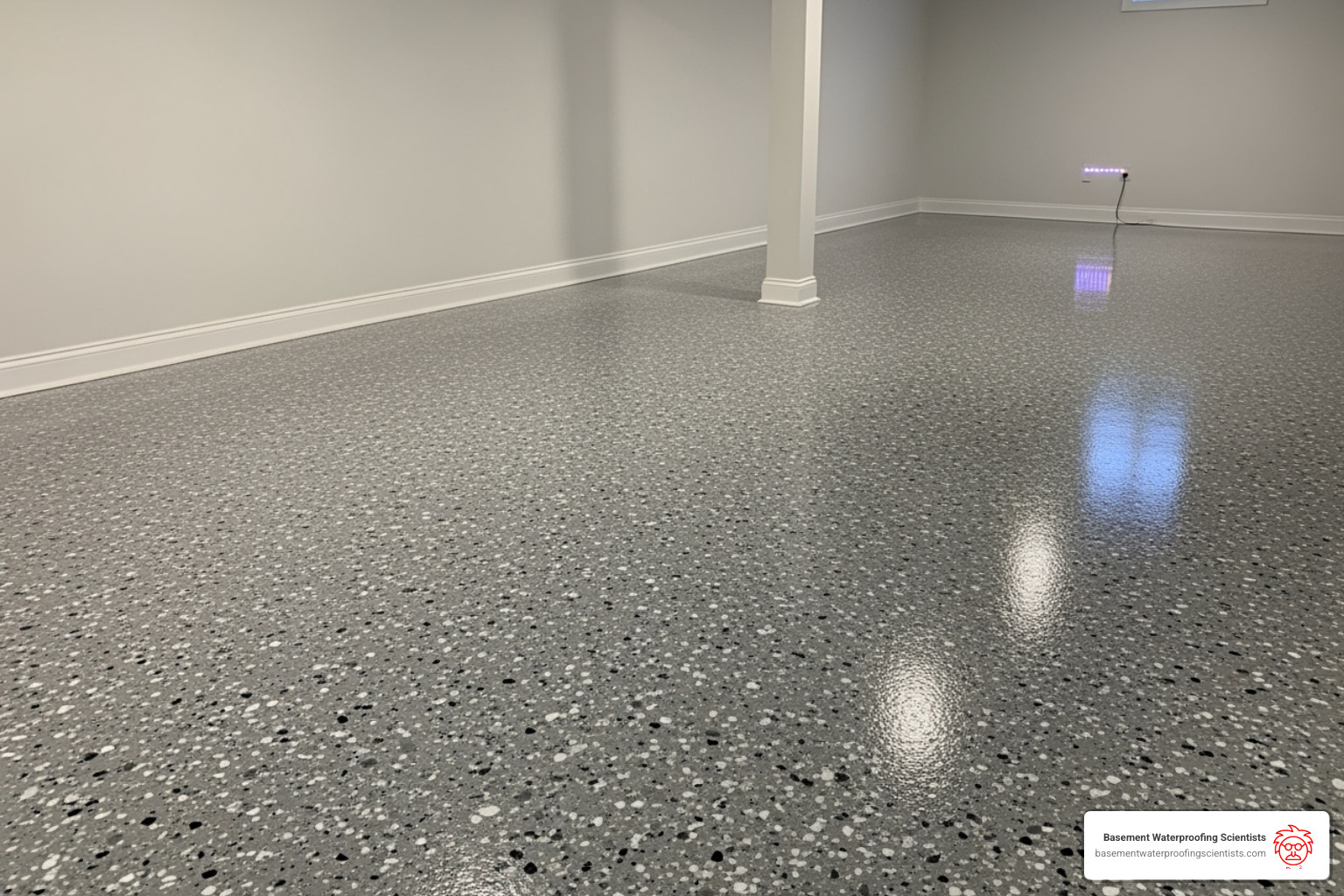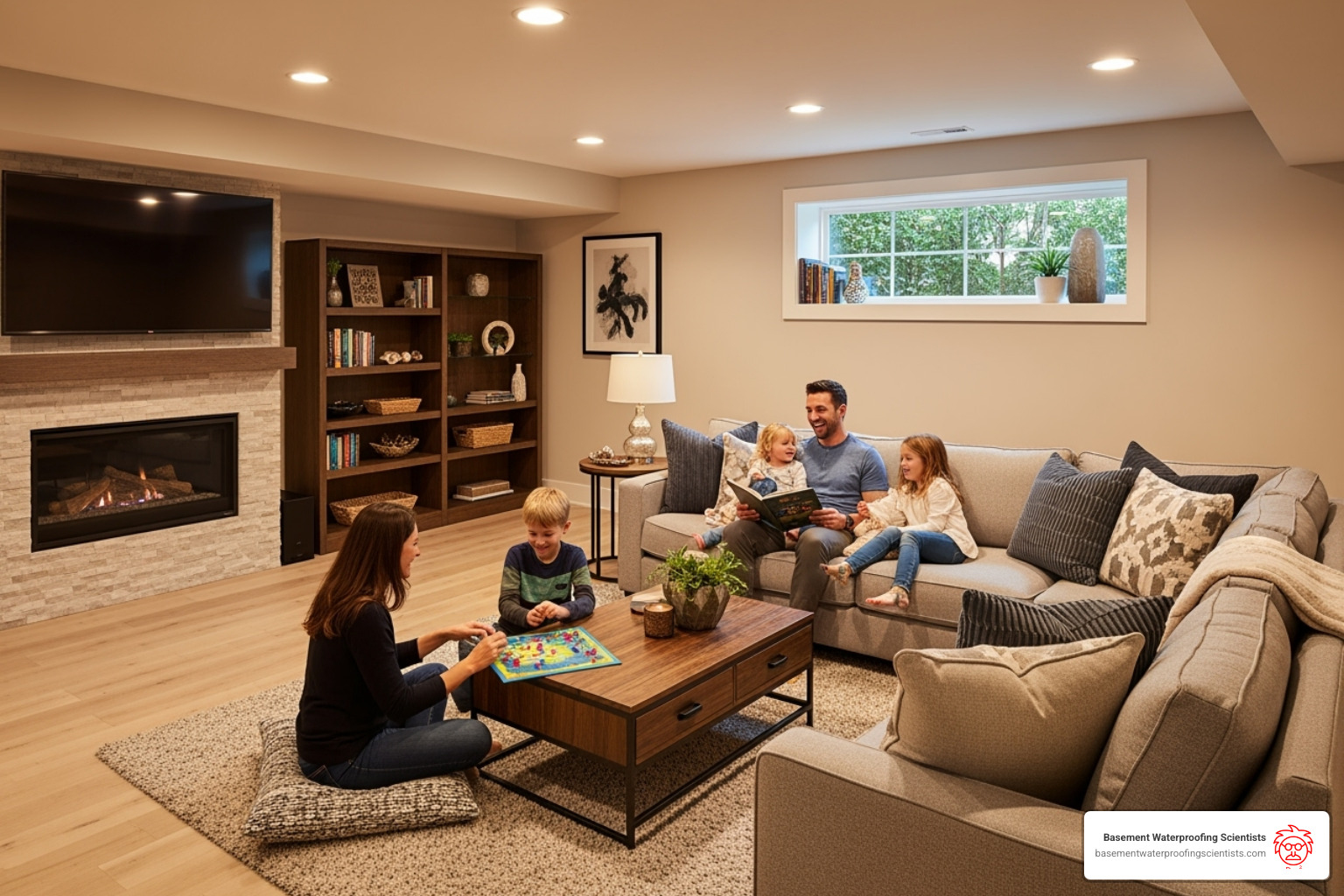Why Choosing the Right Basement Flooring Company Matters
Finding the right basement flooring company is critical, as basement remodeling offers a 70-80% ROI, and the wrong contractor can lead to costly repairs.
Key factors when choosing a basement flooring company:
- Specialization in below-grade environments – Look for companies that understand moisture, hydrostatic pressure, and vapor barriers
- Proper licensing and insurance – Verify credentials and protection for your investment
- Surface preparation expertise – Diamond grinding and crack repair are essential for long-term success
- Industrial-grade materials – Avoid companies using basic DIY-grade products
- Moisture-related warranties – Guarantees against water damage and delamination
- Local references and portfolio – Proven track record in your area’s climate conditions
Basements present unique challenges that standard flooring contractors often overlook. Moisture from concrete slabs, temperature fluctuations, and potential flooding require specialized knowledge and materials. The wrong choice can lead to peeling floors, mold growth, and expensive do-overs.
Many homeowners learn this the hard way. As one industry expert notes: “Some basement finishing projects begin by removing moldy, moisture-damaged finish materials that shouldn’t have been installed in the first place.” According to the EPA’s guide on moisture control, proper moisture management is essential for preventing mold growth and structural damage in below-grade spaces.
I’m Darin Garvey. With over 30 years of experience helping Philadelphia-area homeowners with basement moisture and flooring, I know what separates a true professional basement flooring company from the rest.

Basement flooring company terminology:
First, Assess Your Basement’s Unique Environment
Your basement is a unique, below-grade environment. Before discussing colors or finishes, a reputable basement flooring company must first understand the conditions beneath your feet.
Moisture is the silent destroyer of basement floors. Your concrete slab constantly absorbs moisture from the soil and releases it as vapor, a process that can ruin the wrong type of flooring. I’ve seen too many beautiful installations fail because this crucial first step was skipped.
Assessing the concrete slab condition is vital. Hairline cracks aren’t just cosmetic; they can indicate hydrostatic pressure—water in the soil pushing against your foundation. Crack inspection reveals potential entry points for water. Even tiny cracks can become major problems if not properly addressed before flooring installation. This is where our expertise in waterproofing basement floor solutions becomes invaluable.
The intended use of your space also matters enormously. A home gym where weights are dropped has different needs than a playroom for kids or a workshop with chemicals and heavy tools. Each scenario demands different durability and performance from your flooring.
Why a Moisture Test is Non-Negotiable
Skipping a moisture test is where many flooring projects go wrong. Even a basement that feels bone dry can have significant moisture wicking up through the concrete slab.
Vapor barriers are critical to manage this invisible enemy. Without proper moisture management, you’re setting yourself up for a cascade of problems. Mold and mildew prevention is about protecting your health and your investment from costly repairs. I’ve seen beautiful floors start peeling and delamination within months because moisture wasn’t properly addressed. The adhesives fail, coatings bubble up, and suddenly you’re looking at an expensive do-over.
Professional testing methods reveal the true moisture levels, not just what’s visible on the surface. Think of moisture testing as insurance for protecting your investment. It’s a small step that prevents major headaches. Any basement flooring company worth hiring will insist on it—be suspicious of any who try to skip it.
Planning for Your Basement’s Future Use
Once moisture is addressed, we can plan for your lifestyle. This isn’t just about aesthetics; it’s about matching the floor to its function.
Durability requirements vary dramatically. A quiet reading nook has different needs than a teenager’s hangout space. Foot traffic patterns and impact resistance are crucial considerations, especially if you plan activities that involve dropping things.
Your aesthetic goals matter too, of course. We want to create a functional living area that you’ll enjoy. But in basements, form must follow function. There’s no point in having a gorgeous floor that can’t handle real-world use.
Proper planning ensures your basement becomes a true extension of your home, adding both enjoyment and value.
Comparing Popular Basement Flooring Solutions
When you’re ready to transform your basement, the flooring options can feel overwhelming. As a basement flooring company with three decades of experience, we’ve seen what works and what fails in below-grade environments. Not all flooring is created equal when it comes to basements.
Here’s a look at the most popular basement flooring solutions:
| Feature | Epoxy Flooring | Luxury Vinyl Tile (LVT)/Plank (LVP) | Engineered Hardwood (Basement Grade) |
|---|---|---|---|
| Durability | Excellent; highly resistant to scratches, impact, chemicals, and abrasion. | Very Good; durable, scratch-resistant, good for high-traffic. | Good; durable, but can be susceptible to scratches and dents. |
| Water Resistance | Excellent; seamless, non-porous, acts as a vapor barrier. Impervious to water. | Excellent; 100% waterproof layers, ideal for moisture-prone areas. | Good (for engineered); stable against humidity, but not fully waterproof. |
| Cost (Installation) | Moderate to High; depends on prep, system, and complexity. | Moderate; generally less than epoxy or top-tier engineered wood. | High; materials and installation can be costly. |
| Maintenance | Very Low; easy to clean, stain-resistant, no waxing needed. | Low; easy to clean, sweep, and mop. | Moderate; requires specific cleaners, susceptible to water spots. |
| Aesthetics | Highly customizable; vast color options, metallic, flake, gloss. | Mimics natural wood/stone; wide range of styles and textures. | Authentic wood look; classic and sophisticated feel. |
| Comfort | Hard surface; can be cold underfoot without radiant heating. | Firmer than carpet, but warmer than concrete/tile; can be installed over underlayment. | Firmer than carpet, but can feel warmer than tile. |
| Longevity | 15-20+ years (professional installation) | 10-20 years | 15-30 years (if properly maintained and moisture controlled) |
The key is choosing materials that handle the moisture and temperature changes unique to below-grade living. That’s where our expertise in basement floor coatings becomes invaluable.
The Case for Epoxy and Resin-Based Coatings
For basements, professional-grade epoxy is a top performer. This isn’t a DIY kit from a hardware store; it’s an industrial-strength system designed to last for decades.
Epoxy’s greatest strength is its seamless and non-porous protection. Unlike tile or planks, epoxy creates one continuous surface with no gaps for moisture to hide. It acts as its own vapor barrier, which is crucial for basements.
Its durability and chemical resistance make an epoxy resin basement floor practically bulletproof. It can withstand heavy use for over fifteen years and still look new. Spills like paint thinner or mud are no match for epoxy.
The unlimited design options are where epoxy gets exciting. We can create stunning metallic finishes that mimic flowing rivers or marble. Color flakes add texture and slip resistance. The basement floor epoxy paint options today are truly amazing. One client’s friends mistook her new epoxy floor for expensive marble—that’s the kind of change we love to see.
Understanding Other Waterproof Options
While we love epoxy, we’re not a one-trick-pony basement flooring company. Different basements call for different solutions.
Luxury Vinyl Plank (LVP) has improved dramatically. Today’s LVP is 100% waterproof and convincingly mimics real wood or stone. It’s warmer underfoot than tile and more forgiving to dropped objects.
Interlocking rubber tiles are perfect for home gyms, workshops, and utility areas. They offer excellent impact absorption and water resistance, and individual tiles can be replaced if damaged.
Engineered inorganic materials are the future of basement flooring. The key is inorganic—materials that don’t provide food for mold. We strongly advise against organic materials like carpet, solid wood, or wood-based subflooring on concrete, as they absorb moisture and invite problems.
The best flooring in the world will fail if installed over a problematic concrete slab. Choosing a basement flooring company that understands moisture management is the key to success.
What to Look for in a Top-Tier Basement Flooring Company
Choosing a basement flooring company can feel overwhelming. However, not all contractors are equal, especially for basements. We’ve seen too many projects fail because a general installer didn’t understand below-grade environments.
The results? Peeling floors, mold growth, and wasted investments. It’s frustrating and completely avoidable with the right contractor.
Experience with basements is non-negotiable. A specialist understands hydrostatic pressure, seasonal concrete behavior, and the subtle signs of moisture that can ruin a floor. They know how to prevent the problems that arise from taking shortcuts.
Specialization in moisture mitigation separates the pros from the pretenders. The best basement flooring company assesses moisture first, addresses underlying water issues, and ensures the concrete is properly prepared before any flooring is installed.
Licensing and insurance are must-haves. Always verify these credentials to protect yourself and your investment.
When evaluating companies, ask to see their portfolio of local work. A contractor familiar with your area’s climate and common basement challenges will deliver better results.
Customer testimonials and reviews offer valuable insight, but don’t stop there. Ask for direct references and call previous clients to ask about their experience and how the floor has held up. Just like quantifying an advisor’s value in financial planning, a specialized flooring expert protects your home equity investment.
Transparent pricing should be standard. A reputable company provides detailed, written quotes outlining all costs. Be wary of vague estimates or demands for large upfront payments.
The Importance of a Specialized Basement Flooring Company

A regular flooring installer may not be equipped for your basement. Basements are complex environments requiring an understanding of below-grade conditions and a building science approach.
Your basement floor is in constant contact with the earth. Moisture moves through concrete and temperatures fluctuate, creating pressures that can destroy improperly installed flooring. A specialized basement flooring company anticipates these dynamics.
You’re not looking for just a flooring installer; you need a contractor with comprehensive knowledge of waterproofing and long-term performance. They know that proper surface preparation with diamond grinders isn’t just recommended—it’s critical for success.
A building science approach means considering the entire basement system. This expertise is vital for projects like basement finishing Philadelphia where multiple systems must work together.
Questions to Ask a Potential Basement Flooring Company
When interviewing contractors, their answers to these questions will reveal their expertise. A knowledgeable basement flooring company will appreciate your diligence.
- “What is your surface preparation process?” Look for a detailed answer covering moisture testing, diamond grinding, and crack repair. If they just say “cleaning the floor,” that’s a red flag.
- “What type of materials do you use?” They should mention industrial-grade, moisture-resistant systems designed for below-grade use, not organic materials that can harbor mold.
- “Do you offer a warranty against moisture-related failure?” A confident contractor backs their work with a comprehensive warranty covering delamination and moisture issues.
- “Can you provide local references?” They should be eager to connect you with previous clients, especially for projects like basement finishing Lancaster PA.
- “How do you handle existing moisture issues?” The right answer involves a proactive moisture assessment and recommending waterproofing solutions before flooring installation begins.
The Professional Installation Process: From Prep to Finish
A professional basement flooring company provides a detailed, methodical installation process that ensures results last for decades, not just years. Let me walk you through the steps.
Initial Consultation and Estimate
Every project starts with understanding your unique situation. During our initial consultation, we examine the space, inspect the concrete for cracks or moisture signs, and discuss your vision. A home gym has different needs than a family room.
We also perform a moisture test using specialized equipment. This step is not optional; it’s the foundation of a successful project.
Based on this assessment, we provide a detailed, written estimate with no hidden costs, so you know exactly what to expect.
Surface Preparation: The Foundation of Success
Proper surface preparation is the most critical step for long-term success and where most DIY attempts fail.
We begin with diamond grinding to mechanically profile the concrete. Our grinders remove old sealers, coatings, and contaminants. More importantly, this process opens the concrete’s pores, creating a strong mechanical bond for the new coating. Without this step, floors will eventually peel. This ensures a 20-year lifespan versus one that fails in two.
Next is crack and pit repair. We carefully fill and smooth every imperfection to create a perfect canvas. This attention to detail is what separates professional applying epoxy paint to concrete floor from amateur work.
Primer and Base Coat Application
Once the concrete is prepared, we apply a high-quality primer designed for basements. This primer improves adhesion and acts as an additional moisture vapor barrier.
The base coat follows, bringing your chosen color to life. If you’ve selected decorative flakes, we broadcast them into the wet base coat with precise timing for proper adhesion.
Topcoat and Finishing Touches
The final step is applying the protective topcoat, usually a clear polyaspartic or urethane. This gives your floor its incredible durability, chemical resistance, and easy-to-clean glossy finish.

We apply multiple thin coats, allowing each layer to bond properly for optimal performance.
Curing Times
Patience is key. While you may be able to walk on the floor within 24 hours, full cure times vary. We’ll provide specific instructions on when you can move furniture back and resume heavy use to ensure you get the full 15-20+ year lifespan.
DIY Kits vs. Professional Installation
While DIY kits seem appealing, basement floors are not the place to learn on the job.
Professional surface preparation requires specialized diamond grinders. This equipment is expensive and has a steep learning curve.
Industrial-grade materials also make a huge difference. Our epoxy systems are thicker, more durable, and designed to handle moisture vapor transmission far better than thin, water-based DIY kits.
Our work includes a comprehensive warranty and guarantee. If something goes wrong with our materials or workmanship, we fix it. A professional installation lasts 15-20+ years, while DIY floors often fail within a few years. Factoring in the cost of redoing a failed project, professional work is more cost-effective long-term. For more details, see our guide on how to epoxy a basement floor.
Frequently Asked Questions about Basement Flooring
After thirty years in this business, I’ve heard the same questions repeatedly. Here are the answers you need when considering new basement flooring.
How much does professional basement flooring cost?
The cost depends on several key factors. Square footage is the starting point, but the condition of your concrete also significantly impacts the price. Extensive cracks or old coatings require more prep work.
The type of system you choose also makes a difference. A basic solid-color epoxy costs less than a decorative metallic finish. While the average cost for basement waterproofing is between $4K and $8K, basement flooring company projects vary. We provide transparent pricing so you know what you’re investing in. For a full breakdown, see our guide on epoxy basement floor cost.
You’re investing in a long-term solution. The durability and maintenance savings often outweigh the upfront price.
How long does an epoxy basement floor last?
This is where professional installation shines. When a qualified basement flooring company uses industrial-grade materials and proper techniques, your epoxy floor should last 15-20 years or longer.
This contrasts with DIY kits, which often fail within years. The difference is material quality, surface preparation, and installation expertise. Professional systems are engineered to handle heavy traffic, impacts, and moisture. Regular maintenance has minimal impact on longevity.
Our article on the best epoxy for basement concrete floor explains what makes professional systems so durable.
What maintenance does basement flooring require?
Quality basement flooring like epoxy is incredibly easy to maintain, a welcome change from carpet or wood.
Daily cleaning is simple. A quick sweep with a dust mop is usually all that’s needed, as dirt sits on the non-porous surface.
For deeper cleaning, use a damp mop with mild soap. Avoid harsh chemicals, which are unnecessary. The floor’s stain resistance is remarkable; oil, grease, and paint wipe up easily.
Unlike other flooring, you won’t worry about water damage or mold growth. It’s a home improvement that actually makes life easier. For more care details, explore our guide to epoxy floor coatings.
Conclusion
Choosing the right basement flooring company is a long-term decision that protects your investment, health, and peace of mind. It’s about more than just aesthetics.
As we’ve covered, success starts with understanding your basement’s unique environment through a moisture assessment, followed by planning for your space’s future use.
Specialized solutions like epoxy handle what basements throw at them. Moisture, temperature swings, and heavy use—they take it all in stride while looking fantastic for years.
After 30 years in this business, I know the value of a moisture-proof solution cannot be overstated. At Basement Waterproofing Scientists, we’ve seen countless renovations ruined by preventable water damage. We always start by identifying leak sources to create a dry foundation before any flooring is installed.
You’re choosing a partner, not just a contractor. Look for a company that prioritizes surface preparation, uses industrial-grade materials, offers solid warranties, and welcomes detailed questions.
The most important lesson? Solve the root water problems first. Once your basement is truly dry, the creative possibilities are endless. You’ll have the confidence that comes with a solid foundation.

Your basement change starts with one simple step. Ready to transform your space with expert basement floor coatings? Let’s create a space that serves your family beautifully for decades, built on the solid foundation of a permanently dry basement.

